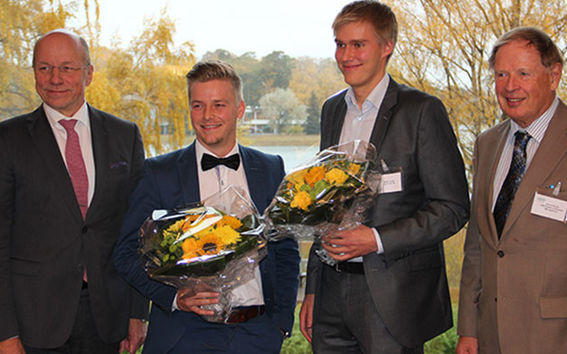The best theses in the energy industry were recognised at the World Energy Council Finland's Energy Day

Each year, the Future Energy Leaders programme recognises the best theses in the energy field. This year's award winners came from the energy technology and energy economy fields.
First prize in the energy technology category went to Aalto University's Valtteri Vainio for his master's thesis ”Efficient heat recovery technologies in cruiseline ships”, which he performed for Meyer Turku, formerly STX. Professor Sanna Syri was the thesis advisor.
World Energy Council Finland and the Society for Finnish Energy Economists asked energy economy professors and departments to propose deserving theses. Seven of the proposed theses eventually competed for the award of best thesis in 2014. Along with Vainio, the jury recognised Tuomas Vanhanen from the Technical University of Tampere for his master's thesis “The evolving requirements for smart secondary substations in three European regulatory market environments”. Each award was worth 3 000 euros.
The jury considered Vainio's work to be extremely interesting. According to Professor Jorma Routti, who presented the awards, Vainio's master's thesis is important for the Finnish shipbuilding industry.
'Ships are complicated systems that consume a lot of energy. Maximising energy economy management for the whole system provides the entire industry with a major advantage. This is the reason why the energy technology award went to Valtteri Vainio,' said Routti
Vainio explained that he was delighted but also surprised to receive the award.
'It feels really great and it was also a bit of a surprise to me. I really didn't expect this award,' he stated
Vainio found his master's thesis topic in 2011 when he got a summer job at a shipyard.
'I worked at the shipyard for two summers before starting my master's thesis. After realising that a lot of things could be done better with regard to the heating systems of ships, we started considering how to optimise energy consumption. The actual work and research took seven months, even though the ideas developed over a longer period of time,' explains Vainio.
Today Vainio works as an engineer at Meyer Werft's Turku Shipyard.
Future Energy Leaders is part of the World Energy Council and consists of 100 young energy industry professionals. The purpose of FEL is to educate energy leaders for the next generation. The organisation has 100 people from different sectors of the energy industry and the programme operates in 50 countries.
Learn more about Vainio's master's thesis at:
https://aaltodoc.aalto.fi/handle/123456789/12880
WEC Finland http://wecfinland.fi
- Published:
- Updated:
Read more news

Anastasia Koptsyukh and Ewald Kibler have been awarded Best Paper Award 2023 BCERC
They have been awarded the Best Paper in Social Entrepreneurship by the MEANS Center for Entrepreneurship Studies of Illinois State University and Babson College
Award-winning doctors in electrical engineering share their favorite aspects of their doctoral studies
Elli Leppänen, Henri Hentilä, Henrik Kahanpää and Alec Wright were awarded for their outstanding dissertations
Doctoral Researcher David Wunder wins best research translation award at BCERC entrepreneurship research conference
Research translations highlight important implications of underlying research studies for entrepreneurs and others involved in entrepreneurial ecosystem